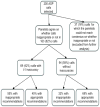Effect of communication errors during calls to an antimicrobial stewardship program
- PMID: 17994518
- PMCID: PMC3653314
- DOI: 10.1086/523861
Effect of communication errors during calls to an antimicrobial stewardship program
Abstract
Objective: To determine how inaccurate communication of patient data by clinicians in telephone calls to the prior-approval antimicrobial stewardship program (ASP) staff affects the incidence of inappropriate antimicrobial recommendations made by ASP practitioners.
Design: A retrospective cohort design was used. The accuracy of the patient data communicated was evaluated against patients' medical records to identify predetermined, clinically significant inaccuracies. Inappropriate antimicrobial recommendations were defined having been made if an expert panel unanimously rated the actual recommendations as inappropriate after reviewing vignettes derived from inpatients' medical records.
Setting: The setting was an academic medical center with a prior-approval ASP.
Patients: All inpatient subjects of ASP prior-approval calls were eligible for inclusion.
Results: Of 200 ASP telephone calls, the panel agreed about whether or not antimicrobial recommendations were inappropriate for 163 calls (82%); these 163 calls were then used as the basis for further analyses. After controlling for confounders, inaccurate communication was found to be associated with inappropriate antimicrobial recommendations (odds ratio [OR], of 2.2; P=.03). In secondary analyses of specific data types, only inaccuracies in microbiological data were associated with the study outcome (OR, 7.5; P=.002). The most common reason panelists gave for rating a recommendation as inappropriate was that antimicrobial therapy was not indicated.
Conclusions: Inaccurate communication of patient data, particularly microbiological data, during prior-approval calls is associated with an increased risk of inappropriate antimicrobial recommendations from the ASP. Clinicians and ASP practitioners should work to confirm that critical data has been communicated accurately prior to use of that data in prescribing decisions.
Conflict of interest statement
All authors report no conflicts of interest relevant to this article.
Figures
References
-
- Cosgrove SE. The relationship between antimicrobial resistance and patient outcomes: mortality, length of hospital stay, and health care costs. Clin Infect Dis. 2006;42 (Suppl 2):S82–9. - PubMed
-
- Safdar N, Maki DG. The commonality of risk factors for nosocomial colonization and infection with antimicrobial-resistant Staphylococcus aureus, enterococcus, gram-negative bacilli, Clostridium difficile, and Candida. Ann Intern Med. 2002;136(11):834–44. - PubMed
-
- Hecker MT, Aron DC, Patel NP, Lehmann MK, Donskey CJ. Unnecessary use of antimicrobials in hospitalized patients: current patterns of misuse with an emphasis on the antianaerobic spectrum of activity. Arch Intern Med. 2003;163(8):972–8. - PubMed
-
- National Nosocomial Infections Surveillance (NNIS) System Report, data summary from January 1992 through June 2004, issued October 2004. Am J Infect Control. 2004;32(8):470–85. - PubMed
-
- John JF, Jr, Fishman NO. Programmatic role of the infectious diseases physician in controlling antimicrobial costs in the hospital. Clin Infect Dis. 1997;24(3):471–85. - PubMed
Publication types
MeSH terms
Substances
Grants and funding
LinkOut - more resources
Full Text Sources


